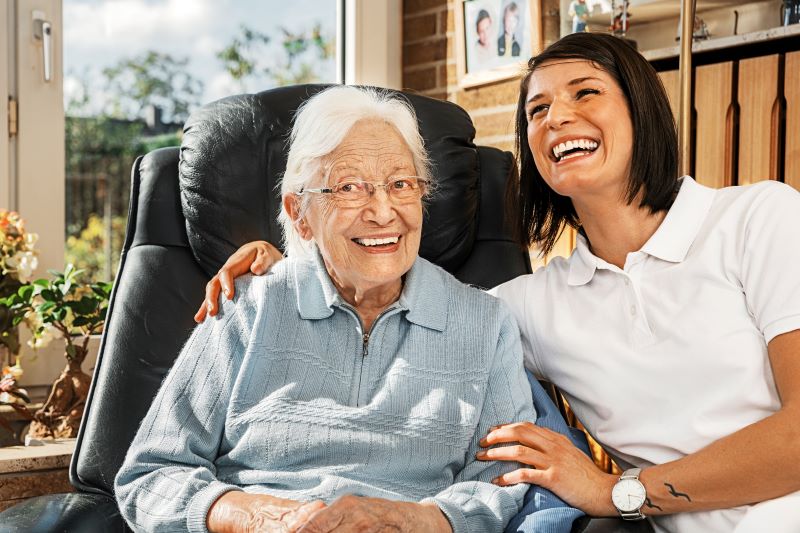- 5 Star Home Care COVID-19 Update PLEASE CLICK HERE
Easy Ways to Help a Loved One Prevent Memory Loss
These Foods Will Help Promote Bone Health
May 7, 2019Home Care: For More Than Just Elder Parent Care
March 14, 2020In recent years, researchers have been surprised to discover that lifestyle choices can play a significant role in maintaining a healthy memory. While genetic factors and normal aging processes are unavoidable, high levels of stress, toxins, and lack of sleep can all have a negative effect on the human brain’s ability to process memory.
These healthy tips will not only help anybody engaged in elder care in Philadelphia keep the memories of their loved ones strong and intact, but can also aid in Alzheimer’s care for people in Philadelphia who are already experiencing symptoms of memory loss.
1. Help Them Learn a Language
Knowing multiple languages might help prevent the onset of memory loss and is not only a great way to keep those neurons firing, but to challenge elderly loved ones to expand their cultural horizons.
Taking a language class or practicing an in-home language course together is a great way to provide companion care in Philadelphia and ward off the effects of memory loss all in one.
2. Learn Meditation Techniques Together
Meditation has not only been proven to be a great technique to reduce stress, but can also have many positive effects on brain health including slowing down the processes that contribute to memory loss.
Simple meditation techniques like mindfulness meditation are safe for almost anybody and can easily be accessed on the Internet or through a local class. Not only is practicing meditation with a loved one a great way to help keep their brain healthy and strong but will help to reduce and manage stress levels for anybody involved in Alzheimer’s care in Philadelphia.
3. Ensure Loved Ones Get Enough Sleep
Not getting enough sleep will increase the amount of cortisol in the bloodstream and increase stress levels, which in turn will increase the risk of developing or accelerating memory loss.
This is why all individuals should check in regularly with their loved ones to ensure that they are getting enough sleep every night. It is ideal for elderly people to strive for approximately eight hours of sleep or more to ensure that they are getting all the rest they need to keep their brains healthy.
Many elderly people suffer from symptoms or pain that may prevent them from getting a restful night sleep, but they might avoid bringing up this type of problem for fear of causing extra stress on a caretaker.
Checking in regularly will encourage elderly people to stay up-to-date on their own sleep habits and talk more openly about their sleep patterns. If it is discovered that a senior is having difficulty getting enough sleep on a consistent basis, a doctor should be able to help adjust medication dosage to make a loved one feel more comfortable.
4. Keep Sugar Intake to a Minimum
By helping your elderly loved one consume a heart-healthy diet low in sugar and simple carbs and high in healthy omega-3 fats, caretakers can help to reduce their risk of developing or contributing to existing memory loss.
High sugar consumption, especially in the form of heavily processed white sugars, is a direct contributor to the development of diabetes and diabetes symptoms. Diabetes, in turn, is associated with a greatly increased risk of developing memory loss. By contrast, helping an elderly person maintain a healthy, balanced diet ripe with fresh vegetables and brain-boosting healthy omega-3 will help give their bodies the fuel it needs to keep the brain healthy and prevent mental deterioration.
The Mediterranean diet plan has been shown to be particularly helpful in warding off signs of memory loss, so friends and family should provide aging loved ones with plenty of fresh fish, olive oil, fruits, and vegetables. For example, foods like celery, cauliflower, walnuts, and have all been proven to be especially effective in rebuilding and maintaining memory.
5. Work Out Together
Committing to a daily exercise program with an aging loved one will not only have a positive effect on everybody’s general health and fitness levels but will help keep the effects of memory loss and dementia at bay. Even better, the buddy system is a great way to keep motivation levels strong.
Working up a sweat not only helps to keep the heart and cardiovascular system functioning at optimal levels but also helps stimulate the brain through increased blood flow, encouraging the growth of new cells that will help rebuild neural connections and stop mental deterioration in its tracks. Shoot for at least 45 minutes of gentle aerobic exercise appropriate for seniors like walking, yoga, swimming, or aqua aerobics at least three times a week.
6. Go on a Social Outing
Social interaction is a great way to ward off symptoms like stress, anxiety, and depression, all of which are common in elderly populations and help contribute to increased memory loss. Encouraging an elderly loved one to join for a social event will often give them the extra push they need to get out of the house and start chatting. Try an activity where it is easy for seniors to meet other seniors, like bingo or a senior exercise course. It can also be fun to experience a mentally-stimulating cultural event like a theater performance or art exhibition.
As an added bonus, helping a loved one to build a social network can also provide them with a strong source of support and help reduce the workload of regular caretakers.
7. Share a Laugh
Whether it is through an engaging trip down memory lane, hilarious baby stories, or just taking in a great comedy or movie, finding a way to help a loved one laugh is also a great way to reduce stress and keep their memory strong.
This is one of the most fun and easy ways to help an elderly loved one keep their brain healthy and it will have great benefits for everyone involved!



